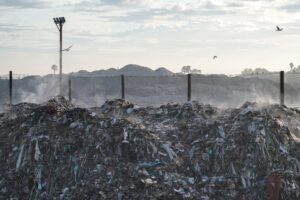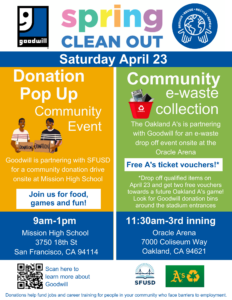By Robin Garnham
Donating to SF Goodwill is an easy way to help the environment and your community. April is Earth Month, which is the perfect time to reduce, reuse and recycle. It’s also spring, so you may be preparing to refresh your home’s décor and your closet to get ready for warmer weather and more entertaining. You could throw away unwanted items, but consider donating your gently used clothes and household items to Goodwill, instead. Goodwill takes your donations and resells them in our thrift stores. Proceeds fund Goodwill’s career services, job training, and jobs for local people experiencing barriers to employment. In addition to creating life-changing opportunities for your neighbors in need, Goodwill is an important outlet for thousands of families to access affordable secondhand goods.
To celebrate Earth Month, we’re excited to highlight how donating and buying secondhand can benefit the environment in so many ways.
Fewer Raw Materials
The production of raw materials used to make new clothes, household items, and electronics is depleting the earth’s resources at an alarming rate. A new t-shirt, for example, is often made of cotton – which requires intensive farming. The World Wildlife Fund estimates that it takes 715 gallons of water to produce one cotton t-shirt. Industrial farming leads to environmental degradation, mono-cultures, overuse of pesticides, and contamination of water supplies. There are also troubling human rights abuses in certain cotton-producing regions. The resale of used items at SF Goodwill allows people to purchase items that they need without contributing to the production of new raw goods. Watch this TEDx talk from William Rogers SFGoodwill’s CEO and join us in taking simple steps to make a BIG difference for our planet.
Manufacturing
It’s not just producing raw materials that are problematic, manufacturing products is also environmentally harmful. Manufacturing is energy-intensive and produces pollutants, which are often not carefully managed or regulated. Aside from sustainability, there are also ethical concerns. Many workers in less-developed countries can endure terrible working conditions. The Rana Plaza collapse in Bangladesh in 2013 was an illustration of how some manufacturers in the garment industry may exploit low wages, child labor, and unsafe labor conditions to maximize profit. The purchase of a new item supports these environmentally harmful manufacturing practices, but purchasing a used item at SF Goodwill and other secondhand stores does not.
Transportation Avoidance
The components of many consumer items travel the globe before they reach you. A new pair of pants might travel from a cotton field in Africa, to a mill in Europe, then to a garment factory in Asia, and finally to a retail store in North America. Companies do not do this to create the best item, they do it to reduce financial costs and source raw materials and labor from the cheapest regions, regardless of the environmental impact. Items crisscross the globe on a vast fleet of container ships. Most container ships run on heavy bunker fuel, a dirty by-product of the petroleum refining process. Each mile in the supply chain increases the item’s environmental impact. Items at SF Goodwill are donated locally, sold locally, and then used locally – which vastly reduces the distance they travel to reach the consumer.
Landfill Diversion
Americans send 140 million tons to landfills each year and throw away approximately 70 pounds of  clothing. This is not sustainable or the best use of our precious resources. landfills can also harm our physical environment. They contain toxic material, leach chemicals into the soil, and produce greenhouse gases as their contents break down. Many of the items that we put into the trash can be reused, repurposed, or recycled. Donating your items to SF Goodwill can help to reduce the number of items going to your local landfills each year. In that way, your unwanted items can be part of the solution rather than part of the problem.
clothing. This is not sustainable or the best use of our precious resources. landfills can also harm our physical environment. They contain toxic material, leach chemicals into the soil, and produce greenhouse gases as their contents break down. Many of the items that we put into the trash can be reused, repurposed, or recycled. Donating your items to SF Goodwill can help to reduce the number of items going to your local landfills each year. In that way, your unwanted items can be part of the solution rather than part of the problem.
Let’s work together!
Donating to SF Goodwill this Earth Month is a step towards creating a virtuous cycle of reducing, reusing, and recycling for the benefit of our local community and planet. Your donation doesn’t require any new energy or raw materials for its manufacture (it’s already made), travels only short distances to reach local thrift store customers, and doesn’t end up wasted in our local landfill. If you have unused clothing and household items you no longer need, bring them to us. Your donation means that SF Goodwill can offer an affordable, more sustainable alternative to purchasing new goods while also helping to offer life-changing opportunities through training and the power of work.
Stop by these two donations drives happening on April 23!




